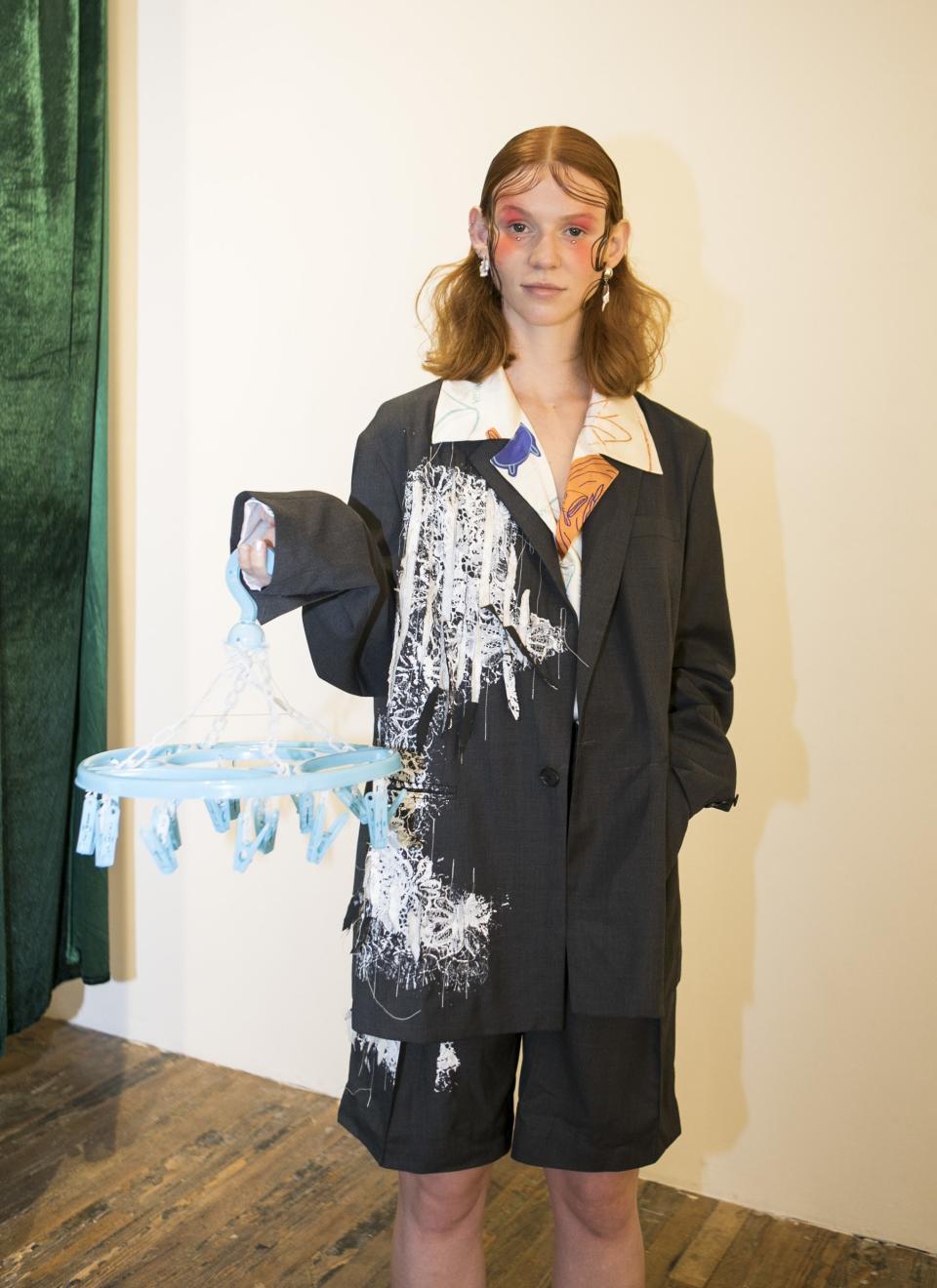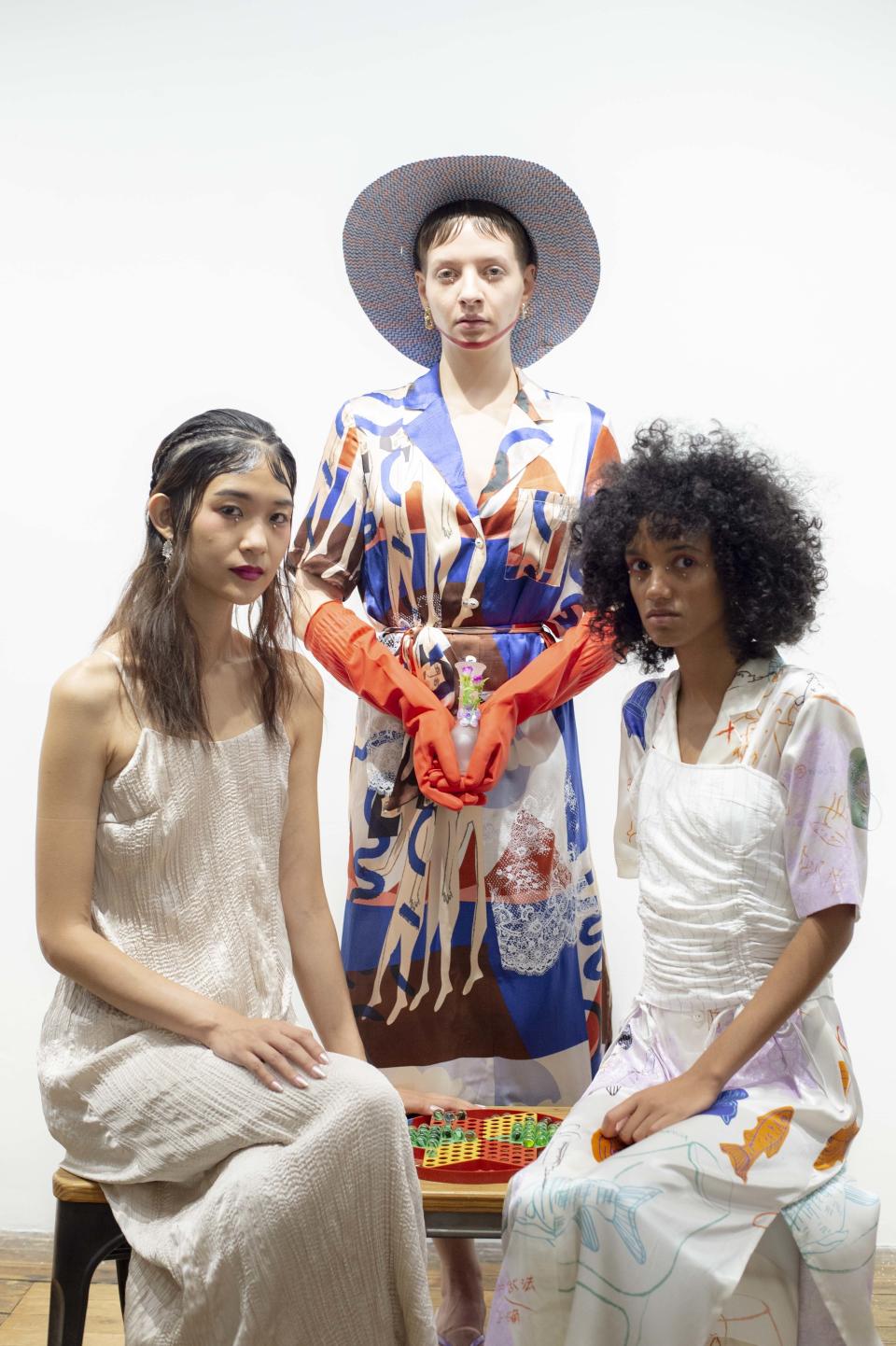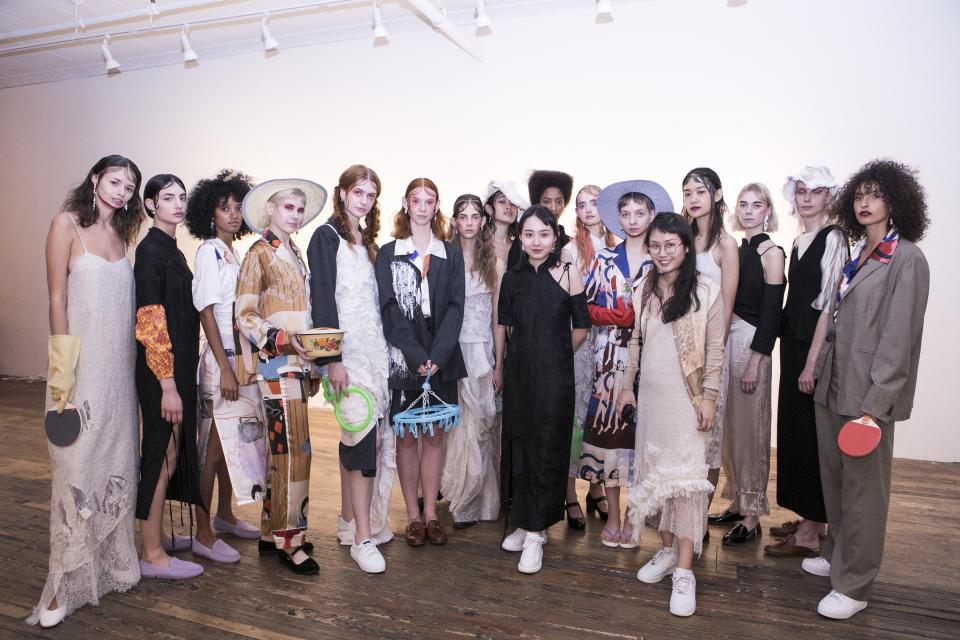Refuse Club is the Designer Duo Using Fashion to Make Statements About Censorship in China
Yuner Shao and “Stef” Puzhen Zhou may have only launched their fashion line Refuse Club less than a year ago, but they’ve already made a major statement. In February, the design duo released their first collection with commentary on the #MeToo movement and how it was being censored in China.
To showcase this, the designers created traditional qipao dresses, or feminine body-con dresses with high necks, and reworked corsets with handmade prints of women applying masks instead of makeup. “There was a lot of sexual harassment happening both here [in the U.S.] and China,” explains Zhou. “This collection was our way of discussing that situation.” The prints served as storytelling illustrations. For instance, some garments were printed with messages about censorship taken directly from internet search engines in China, where results are often censored. According to the Committee to Protect Journalists, “Since 2017, no website or social media account is allowed to provide news service on the internet without the Cyberspace Administration of China’s permission. Internet users are blocked from foreign search engines, news websites, and social media platforms by the Great Firewall.”
The idea for their fall 2019 collection was inspired by the brand’s mission: to use clothing as a platform for social justice and awareness. Even the brand’s name, Refuse Club, has roots in defying conventional norms. The name comes from the 1863 controversial exhibition titled the Salon des Refusés in Paris. Artists like Édouard Manet and Gustave Courbet, both rejected by the official Paris Salon (the official art exhibition of the Académie des Beaux-Arts in Paris) due to being too controversial and provocative, banded together to show their unconventional work in one space. “We had a similar idea because there’s a lot of rules for having your own fashion brand. It’s really hard when you’re not on the official fashion calendar and you don’t have any investors,” says Zhou. “We want to refuse certain things.”
To continue the censorship conversation further, Refuse Club opened an account on WeChat, the Chinese multipurpose messaging, social media, and mobile-payment app. “We talk about censorship, cultural appropriation, problems in the [fashion] industry, more so in China than here [in the U.S.]. Here, there are things that are overexplained and overcorrected, but there, back home, it hasn’t even started,” says Zhou.
For their spring 2020 collection, Shao and Zhou are making another major statement. Now they’re using their platform to showcase another side of social media in China, highlighting different subcultures and identities found in rural China through the Beijing-based social media app Kwai, which the duo dubbed the “less-gentrified version of TikTok.” In 2017, the Wall Street Journal called Kwai “the video app for small-town China,” saying that the app is popular among “the less affluent, less educated people in China.” Explaining further that “some critics view much of Kwai’s content as crude and silly, while the company says it’s an authentic place for average Chinese.”
Refuse Club’s New York Fashion Week presentation had models acting out some of the Kwai video challenges these users are participating in; for example, dripping water on a rock in the same place for one year to try to make a hole. “It’s related to a Chinese myth of using water to drill on a stone,” says Zhou.

Similar to their first collection making a statement on #MeToo in China, their latest collection went back to their custom prints. This time to tell stories about what Kwai users are doing in their short, viral videos. They used lots of lace to represent femininity, but workwear silhouettes to represent the everyday person. “Refuse Club SS20 Collection is inspired by young people from Chinese small towns and villages, by their fashion style and online subcultural presence,” read their collection statement. “We find their fashion energy unique and fun.”
“They tend to have their own way of thinking, which people just want to ignore, because they tend to assume that they are narrow-minded,” says Zhou of the users she researched on Kwai. “But they have unique cultural things going on. I think that’s important, and people in China criticize it so much, because these young people aren’t educated, they don’t have proper jobs, and they want to be influencers on this app.”

It’s what makes Kwai so unique: the odd challenges, the snippets of everyday life from real people. For instance, there are Chinese social media influencers who are either fashion bloggers, actresses, or singers, just like there are in the U.S. Most of these users are popular on Instagram, WeChat, and Weibo, not Kwai.
“Each collection should refuse something. This one is about saying no to this idea of wanting to be an influencer but having to do something that’s very polished,” says Zhou. “With no intention to criticize anyone by reinterpreting their style, the collection is a sarcastic joke, a gesture of saying, ‘Look at how ridiculous the outfit is, and we refuse to change it.’”

Originally Appeared on Teen Vogue

